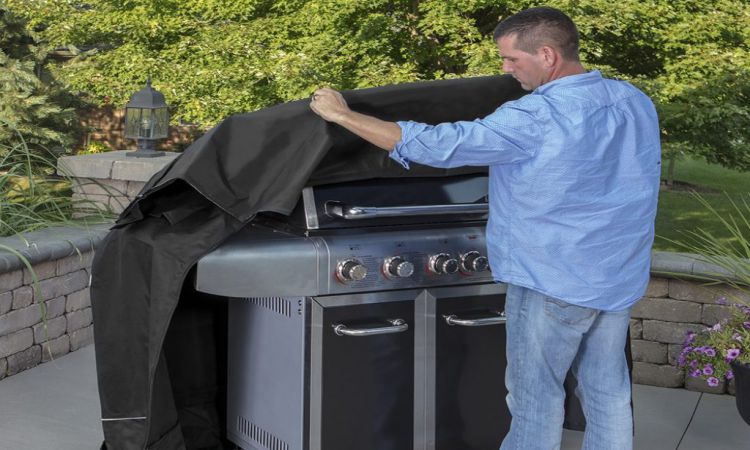 When you think of grill covers, you probably imagine a large piece of vinyl that fits like a glove over your grill. These are key pieces for protecting the investment in expensive grills, but there’s more to using one than meets the eye.
When you think of grill covers, you probably imagine a large piece of vinyl that fits like a glove over your grill. These are key pieces for protecting the investment in expensive grills, but there’s more to using one than meets the eye.
Table of Contents
Having worked with many people to purchase their first grill, I’ve noticed several mistakes when purchasing and using these coverings.
- The main mistake does not know whether or not you need one in the first place. You can definitely use a basic outdoor tablecloth if your grill is in storage during the winter months, but if it’s exposed for much longer than two weeks at a time, you should look into buying an actual grill cover. The reason for this has mostly to do with exposure to weather elements. While any grill is going to get dirty with regular cooking, the elements are really what cause breaks down in the integrity of your grill.
- If you live in a place where it snows or where there’s a lot of rain for months at a time, chances are you’re going to want to get an actual cover made for grills. This way you can keep all that moisture off of your grill and not have to worry about rusting or mold build-up damaging its components. You’ll also be able to prevent other types of damage like scratches from wildlife trying to go after food on the grill (those raccoons will stop at nothing!) as well as prevent leaves and other debris from falling into grill throughout those fall months when you’re not using it.
- The other main mistake people make is simply buying the wrong size grill cover. Just because you have a grill that’s near to one type or another doesn’t necessarily mean you can find a universal cover for it. For example, there are actually over fifty different types of Weber grills, so if your Weber isn’t listed as one of those fifty, it may be difficult to find one that fits correctly. The best thing to do is measure your grill ahead of time and take the measurements into the store with you; this way, you’ll at least know what size to look for. If all else fails, you should be able to bring your grill in and they’ll be able to tell you which size will fit correctly.
- It’s also important to look at the number of individual pieces that are in your grill. By this, I mean that if you have several cooking grates, cast iron grids, or other components that separate for cleaning ease, you’re going to need something larger than just a basic vinyl cover. A cover may not fit properly over these types of grill parts without sitting on top of them and potentially scratching them or even puncturing through the material (which would be especially bad news for cast iron).
- For gas grills, you should purchase a specific type of grill cover designed with venting capabilities. These types will be covered in mesh vents that allow air flow but prevent rainwater from getting into the interior workings of your grill. Make sure the grill cover is compatible with your specific type of gas tank to keep it from leaking or otherwise causing harm.
FAQs:
What are grill covers made of?
Grill covers are made from vinyl, plastic, or a combination of the two. Vinyl is going to be less expensive and typically have a better fit, but plastic can be more durable in harsher climates and will last longer. The most important thing to consider is what your climate is like where you live, as this can determine which material will work best for you.
How do I clean my grill cover?
Because grill covers are being exposed directly to the elements, they’re going to get dirty. It’s just a fact of life – rain, dirt, dust, leaves, debris from trees … it all adds up. The first step you should take is always checking the tag on your grill cover before doing anything so you know how to properly clean it. If the tag doesn’t say, however, a simple soap and water mixture is typically sufficient.
Is there a difference between indoor and outdoor grill covers?
Yes. Indoor grill covers will typically be made from vinyl or some type of lighter cloth-type material that’s easier to clean up after spills, while outdoor grill covers will have mesh vents for ventilation and can be made from heavier plastic materials. The outdoor grill cover is going to be ideal if you’re storing your grill outside all year round. Indoor, on the other hand, might not need as much ventilation (or as the heavy-duty of a material) depending on where it’s stored between uses; garage, porch, basement… these are all areas that might not see as much cold and moisture.
Conclusion
As grill covers are an item that will be constantly exposed to the elements, it’s important to find a grill cover that’s both made of durable and high-grade materials, but also fits your grill correctly. This way, you’re protecting your grill from the harsh weather and ensuring that all parts stay in working condition for as long as possible.






